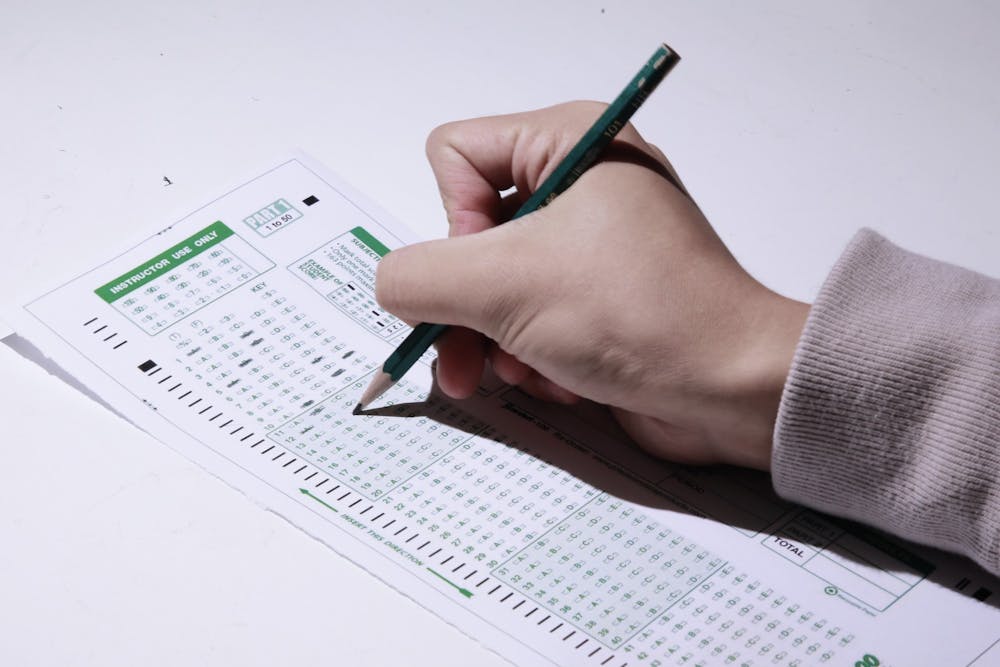Nearly one-third of Penn sophomores did not submit any test scores in their applications, according to a Daily Pennsylvanian analysis.
Using data from the Common Data Set, the analysis examined trends in test scores for incoming first years from 2017 to 2022, comparing Penn to six other Ivy League schools. Dartmouth College was excluded due to missing test score data in 2021 and 2022.
According to the data, approximately 30% of the Class of 2026 did not submit test scores in 2022. This is an 8.7% increase from the previous year — the highest among the Ivy League schools that published SAT score information.
Penn experienced 8.7% decrease in SAT submission rate from 2021 to 2022
Despite having the most significant decrease in test submissions among the Ivy League from 2021 to 2022, Penn's median composite SAT score for incoming first-year students has displayed consistent growth since 2017. However, compared to other Ivy League schools, Penn has experienced a slower growth rate in median SAT scores since enacting a test-optional policy.
In 2023, Penn announced it would continue its undergraduate test-optional admissions policy for the 2023-24 application cycle. The Class of 2027 is the third class admitted under the policy, with the Class of 2025 being the first.
Approximately seven out of 10 of Penn’s incoming first-years did submit test scores in 2022. This places Penn's 2022 test score submission rate as the third-lowest among Ivy League schools excluding Dartmouth, with Columbia University and Cornell University having slightly lower rates at 68% and 59%, respectively.
RELATED:
Jay Rosner | Penn should discard the SAT and ACT
Experts worry that Penn's test-optional application process will benefit wealthier students
Brian Taylor, a managing partner of the college counseling service Ivy Coach, said that Penn has one of the lower submission rates because of what he called "squeakers" — students who think they can be accepted without submitting test scores.
"Based on this data, it seems that there are more squeakers applying to the likes of Penn and Cornell and Columbia, thinking they can squeak into the Ivy League, whereas they know better when they’re applying to the likes of Harvard, Yale, and Princeton," he said.
Median SAT scores have increased for all Ivies after test-optional policy implementation
Compared to the drop in test score submission, Penn’s median composite SAT score has increased steadily since 2017 for enrolled first years, increasing nine points per year on average. Penn is the only Ivy League school where scores grew at a constant rate, with other Ivies experiencing accelerated growth in median scores after test-optional policies were announced in 2020.
If growth were to continue at its current average pace, Penn’s median SAT score would be on a trajectory to reach approximately 1560 by 2025.
Penn is averaging a 9-point per-year increase in its median SAT score
Unlike Penn, whose median test scores have grown at a constant rate since 2019, other Ivies saw a decrease in median test scores from 2019 to 2020. But those schools, like Penn, saw significant jumps in median composite SAT scores following the implementation of test-optional policies.
For Penn's test scores only, the median SAT score has increased from 1490 to 1535 in the past five years, while the median ACT score has increased from 33.5 to 34.5. Penn’s median ACT score also experienced three plateaus since 2017.
Penn's median ACT score grew from 33.5 to 34.5 from 2017 to 2022
Under a test-optional admissions policy, Vice Provost and Dean of Admissions Whitney Soule has said that first years can submit scores if they are happy with them.
“If you take a test and you feel good about the result, then you can include it and we’ll review that, too," Soule wrote in February 2022. "Or, if you take a test and you’re not happy with the result — for how it represents YOU — then you can withhold it, and that's just fine with us."
A request for comment was left with Penn Admissions.
College first-year Moe Mansour — an international student from Lebanon who was admitted as a member of the Class of 2026 but took a leave of absence before beginning this fall — said he submitted his SAT score because he was competing with applicants who had the advantage of taking IB or AP classes.
"People submitted scores, even if it was on the lower end or [in] the 10th percentile," Mansour said of students with whom he has spoken about their test scores.
Taylor said that students who submit scores are typically not submitting scores that are below the mean and added that he would still encourage applicants to submit a test score.
"No matter what schools like Penn tell you, students with great scores will always enjoy an advantage over students who do not submit scores," Taylor said.
Note: The available data does not include students who submitted both SAT and ACT scores.









